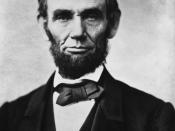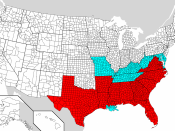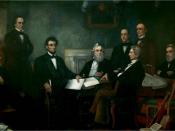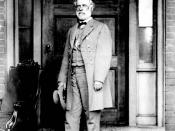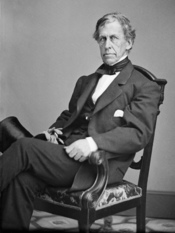The purpose of this paper is to prove that although England never officially intervened in the American Civil War, they were ultimately supporters of the Confederacy throughout the course of the war. The role of Great Britain in the American Civil War is often overlooked. Although, during the early 1860?s, both the North and the South pinned their hopes for the outcome of the struggle on either British intervention or non-intervention. Before the war progressed very far, Britain?s factions began to take sides. The English liberals tended to support the Union because they feared that if the South was able to successfully secede from the Union, the cause of democratic reform in England would be set back many years. Others, however, found themselves in a quandary. Under the doctrine of natural rights, which English liberals strongly supported, all men have the right to set up ?autonomous and free governments.? Many were forced to concede that the Confederates had the right to secede from the union, even if they did not agree with their aims.
Another faction of Britain?s political stance, the Tories, saw the Civil War as a natural outgrowth of a democracy without the stabilizing force of patrician classes. They tended to support the rebellious South to show the rest of Britain just how unbeneficial a democracy like America?s could be.
There were other factors that motivated British interest in the American Civil War besides politics. More than any other consideration, economic concerns influenced British policy towards the war. This helped influence the English opinion against the Union. One of these acts was the Unions use of the blockade. On April 27, 1861, President Lincoln formally notified Great Britain and the rest of the world that all ports were under a naval blockade. This announcement outraged the British textile industry, being that manufacturers bought the majority of their cotton from the South. Many feared that a cutoff of American cotton would severely injure the British economy. Even though this theory was to be proven wrong, the threat alone was enough to turn many textile manufacturers and workers to the Southern cause.
With the cotton issue on their side, the Confederacy saw this as their trump card to absorb British involvement in the war. If the North attacked and blockaded the South, a cotton famine would strike Europe and hopefully the great powers of the land would be forced to intervene, but even this extreme measure proved to be ineffective. From 1857-1860, American cotton exports had outpaced the needs of foreign manufacturers, resulting in a surplus by the start of the war. The British textile industry had enough cotton in reserve to keep itself running for several years. Also, cotton growers in India and Egypt increased their production to fill the gap left by the South?s cotton markets. Although cotton did become scarce in Europe after 1863, the feared ?cotton famine theory? of the Confederacy was never sever enough to force Britain?s hand in the war.
Major problems between the Union and Britain eventually did arise. On May 14, 1861, Britain declared neutrality in the War Between the States, partly because of retaliation against the Union blockade. This British declaration infuriated the North because it was nothing more than a recognition of the Confederacy as a separate state. Under international law, neutrality granted ?belligerent rights? to both North and South, while the Union saw the Confederacy as an internal affair of Illegal rebellion. By declaring its neutrality, Britain came very close to recognizing the South as a separate state. Also, the belligerent rights allowed the Confederacy to solicit loans, contract for arms, and enlist men abroad.
The bitter feelings between Britain and the Union caused by Britain?s neutrality stance and the U.S. blockade were yet to be further embittered. On October 12, 1861, Jefferson Davis sent James Mason of Virginia and John Slidell to Louisiana to Europe as commissioners to represent Confederate interests abroad. The two envoys slipped through the Union blockade and sailed to Havana where they took passage for England on the British steamer Trent. After hearing news of the Confederate blockade-runners, Captain Charles Wilkes and his ship San Jacinto, stopped the Trent and captured the envoys while letting the Trent continue on its way.
In England, the ?Trent Affair? caused an uproar, which almost brought on war. The mere notion that Americans could halt a British ship on the high seas and remove lawful passengers was intolerable. Eleven thousand troops were sent to Canada, the British fleet was put on a war footing, and a sharp note was dispatched to the United States demanding surrender of the prisoners and a prompt apology.
While a great many Union soldiers were anxious to fight the British, President Lincoln and his cabinet were quite aware of the fact that the Union army, already stretched thin, was in no condition to fight an additional enemy. So, in order to save face, the United States agreed to release Mason and Slidell on the grounds that Wilkes had violated international law and had acted without the approval of a superior. War was avoided, but just barely.
The resolution of the ?Trent Affair? did not hinder the question of British recognition of the Confederacy. Two members of the British cabinet, Lord John Russel and William Gladstone continued to clamor for a formal recognition of the Confederate States of America as a sovereign nation.
A turning point for Britain?s involvement in the war occurred when the Emancipation Proclamation went into effect on January 1, 1863. This changed the political and public opinion in Great Britain. Lincoln?s freeing of the slaves was a major blow to the South?s hopes of recognition as a free state. Suddenly the Southern cause looked much less appealing to the English Liberals who had supported the Confederates? right to secede from the Union. The moral dilemma of slavery was too great to allow success in gaining recognition or involvement in the war by strongly abolitionist Britain.
As British and Southern relations deteriorated, so did Britain?s involvement in entering the war. Although they threatened several times, the English never became deeply involved in the American Civil War. The British had strong ideas about the war, and their opinions changed often. At the start of the war, the English in general were neutral, though they quickly split on opinions. The British flirtation with the Confederacy in the early phases of the war was due primarily to competing political factions and not to any ideological affection for the Confederacy. The Trent affair and the Emancipation Proclamation both caused the English to adjust their opinions both ways. If the British had intervened in the war, both physically and defensively, the history of the American nation, and even the world, would have changed dramatically.
